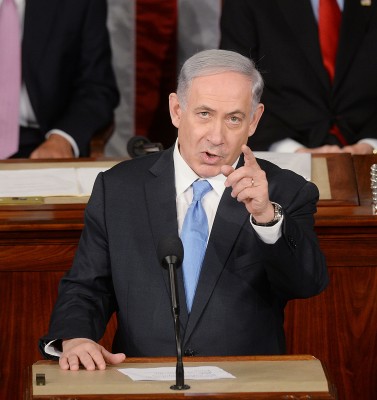Strange Bedmates: Jerusalem-Washington-Tehran
March 11, 2015
On March 4, Israeli Prime Minister Benjamin Netanyahu appeared in front of a joint session of Congress to discuss the dangers of Iranian nuclear proliferation. After much political turmoil, Netanyahu delivered a speech that lasted about an hour to a room full of American representatives from both sides of the aisle, though a good number of Democrats opted out of attending the meeting.
Democratic leaders were very open with their decision not to attend the speech. They very quickly pointed their finger at Speaker of the House John Boehner and blamed him for creating a revived partisan feel within Congress. Truthfully, Netanyahu’s scheduled visit to speak at the American Israel Public Affair Committee (AIPAC) a few weeks prior to his bid for reelection in Israel does not have much to do with the Iranian nuclear negotiations and Boehner’s invitation to Netanyahu: it all comes down to timing. If any of those are not coincidental, it is the interception of Netanyahu’s speech at AIPAC and the Israeli election. Punches are always thrown across the aisle in Washington and that did not change this time around. The Boston Globe quoted Senator Elizabeth Warren saying, “It’s unfortunate that Speaker Boehner’s actions on the eve of a national election in Israel have made Tuesday’s event more political and less helpful for addressing the critical issue of nuclear nonproliferation and the safety of our most important ally in the Middle East.” Senator Warren wasted no time turning Netanyahu’s informative speech about a dire negotiating situation into a political stunt by the speaker and a partisan tactic by Boehner. Senator Al Franken went as far as to refer to the speech as a “partisan spectacle” in a statement he released on Monday.
The deal with Iran, as it stands, is terrible and that is precisely why President Netanyahu’s speech is so emphatic; it reasserts the fact that Iran is the same Iran it has been since its revolution in 1979—untrustworthy and dangerous.
The current deal leaves Iran with the capabilities to create intercontinental nuclear warheads if they choose to. Iran is able to leave a substantial amount of their centrifuges spinning, but must disconnect some for 10 years. Iran is not an uneducated or underdeveloped nation: Iran is a nation of great scientists with great minds and I do not doubt their potential to speedily create nuclear warheads under the guise of using nuclear energy.
The current deal also allows Iran to gain the capital necessary to invest more in nuclear warheads. By lifting the economic sanctions that have been choking Iran for years, the country would gain an influx of liquid capital, which it would be able to direct where it deems necessary. The last concern of the Ayatollah is the well being of his people: his main concern is destroying America and Israel. It is quite obvious that this money would immediately funnel into nuclear research. Iran has no plans of placing its ability to do so on the negotiating table.
Netanyahu’s speech focused on the ongoing negotiations with Iran over their nuclear developments as well as the facts that Western nations and (largely liberal) media are ignoring. Quite frankly, the speech brought into light the issues that were shrouded by the well-crafted partisan squabble that Democrats and the President created. The Prime Minister drew on the long-standing history of Iran, a great nation “hijacked by religious zealots” and hell-bent on jihad; a nation that has consistently and bluntly voiced their desire to destroy the U.S., Israel and, in general, the entirety of the Western world. Netanyahu brought into focus Iran’s long reaching influence in terrorism and tyranny inclusive of Bashar Al-Assad in Syria, Hamas in Gaza, the Houthis in Yemen and Hezbollah in Lebanon, which have given Iran strongholds in Damascus, Sanaa and Beirut.
Iran gaining nuclear capabilities will only cause other countries in the Middle East that fear Iran to get nuclear arms. We would be witnessing a nuclear arms race that could very well rival the one between the U.S. and U.S.S.R. during the Cold War, only an arms race in such a politically rocky region with deep religious rifts would be catastrophic. Iran would not hesitate to wipe out its rivals: whether Jewish, Christian or Muslim. This nuclear deal is potentially paving a path toward a global nuclear genocide.
Prime Minister Netanyahu stated it better than anyone ever could: “If Iran wants to be treated like a normal country, let it act like a normal country.” Iran wants nothing more than to be a global superpower and it has been stomping its feet for years trying to get a seat at the “big kid’s table.” If there is anything that sets global super powers apart from those subjugated by them, it is their stockpile of nuclear warheads. But these stockpiles are simply there as symbolic defenses, which keep our global world in check. An Iran capable of launching nuclear warheads would simply drive the world into turmoil.










